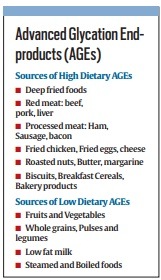Should Indians be changing their cooking styles dramatically as a nation that is carrying the highest diabetes burden? Researchers have now found that the heat involved in cooking produces advanced glycation end-products, or AGEs, harmful compounds that form when proteins or fats interact with sugars in the bloodstream. This process is known as glycation, which creates conditions that accelerate blood sugar levels in the body.
“Intense cooking methods like frying or grilling can dramatically increase AGE levels in food. For instance, foods cooked at high temperatures for extended periods generate more AGEs compared to those prepared using gentler techniques. What’s concerning is that AGEs accumulate in your body over time because they cannot be flushed out easily. Whenever you grill, bake, fry or toast, you are creating AGEs. Diet is considered the biggest source of this harmful compound. So even if you think you are eating healthy and grilling your food, it can still be high in AGEs,” says diabetologist Dr V Mohan, whose Madras Diabetes Research Foundation conducted a clinical trial that established the link between cooking methods and their resultant impact on diabetes. The study, which was funded by the Department of Biotechnology, Ministry of Science and Technology, was published in the International Journal of Food Sciences and Nutrition, recently.
HOW HIGH AGE FOODS CAUSE DIABETES
The buildup of AGEs has been associated with various health issues, including inflammation, oxidative stress, insulin resistance and cellular damage. “Inflammation is often the trigger for elevated plasma lipid levels and the development of insulin resistance, eventually resulting in fatty liver disease, atherosclerosis and diabetes. Insulin resistance is a stage where your cells in muscles, fat and liver don’t respond well to insulin and can’t easily take up glucose from your blood.
As a result, your pancreas makes more insulin to help glucose enter your cells. When your pancreas cannot make enough insulin and the cells become too resistant to it, glucose levels rise in your blood, leading to diabetes. There is oxidative stress, a condition where free radicals in the body are higher than antioxidants,” explains Dr Mohan.
His 12-week study involved 38 overweight and obese adults with a body mass index (BMI) of 23 or higher. “Researchers compared the effects of two diets: one high in AGEs and the other low in AGEs. Participants on the low-AGE diet demonstrated improved insulin sensitivity and lower blood sugar levels, while those on the high-AGE diet showed increased AGE levels and inflammation,” he adds.

Other than diabetes, dietary AGEs can lead to various chronic conditions like heart disease, chronic kidney disease, Alzheimer’s and even some forms of cancer. “AGEs can damage blood vessels, increasing the risk of heart issues over time. Moreover, studies suggest that AGEs play a role in neurodegenerative diseases like Alzheimer’s. Their presence may accelerate cognitive decline by promoting inflammation in the brain. Additionally, other health concerns such as rheumatoid arthritis and end-stage renal disease are associated with high dietary AGE intake. The implications extend beyond individual ailments, hinting at broader impacts on overall well-being as these compounds interfere with vital biological processes,” says Dr Mohan.
WHICH FOODS ARE HIGH IN AGEs?
These comprise red meat and mostly all the foods we treat as snackable — fried items like chips, fried chicken, samosas and pakoras; baked goods such as cookies, cakes and crackers; processed foods like ready-made meals, margarine and mayonnaise; and animal-based foods cooked at high temperatures, including grilled or roasted meats (meat and poultry) and roasted nuts like walnuts and sunflower seeds.
“Dietary AGEs can sneak into our meals from various sources. A significant contributor is processed meats, including bacon and sausages. These often undergo high-temperature cooking methods that promote AGE formation. High fat dairy products may play a role, too. Certain cheeses, butter and cream cheese are packed with these compounds due to their fat content and the way they are prepared. Fried foods are another culprit. Cooking oils at high temperatures — think fried eggs or crispy potato chips — can dramatically elevate AGE levels in your diet,” says Dr Mohan.

But what he points out as a matter of concern is the consumption of nuts. “While healthy in moderation if taken raw, roasting them can increase their AGE content significantly,” says Dr Mohan.
He advises caution on sauces like mayonnaise and certain dressings as well. “They often contain fats that contribute to higher AGE concentrations when heated or processed,” he adds.
HOW TO REDUCE INTAKE OF DIETARY AGEs
Reducing dietary AGEs can be a straightforward process with some mindful choices. “Start by opting for cooking methods that generate fewer AGEs. Steaming or boiling food generally produces lower AGE levels compared to grilling or frying. Incorporate more unprocessed plant foods into your meals. Fresh fruits, leafy vegetables and whole grains not only add nutrients but also help mitigate AGE formation. Experiment with herbs and spices in your dishes. Ingredients like cinnamon, turmeric and ginger have been shown to reduce the production of AGEs during cooking,” says Dr Mohan.
Consider marinating meats before cooking. “Using acidic ingredients like vinegar or citrus juice can slow down the glycation reaction between proteins and sugars,” he adds.
What matters in the end are simple adjustments in your everyday diet and weight management that are bound to have results. A 2016 study in the US investigated the effects of a low-AGE diet in 138 people with obesity. It noted increased insulin sensitivity, a modest decrease in body weight and lower levels of AGE, oxidative stress and inflammation. The best is to eat antioxidant-rich foods. In laboratory studies by Polish researchers, natural antioxidants, such as vitamin C and quercetin were shown to hinder AGE formation. Several animal studies have shown that some natural plant phenols can reduce the negative effects of AGEs.

